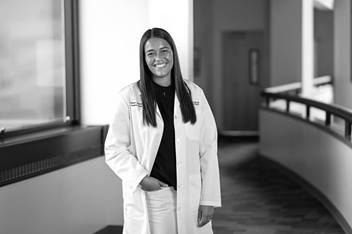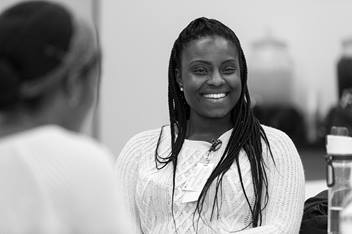Scholarly Activity
Fellows are involved in a variety of scholarly and academic activities including research, quality improvement and teaching. There are also opportunities to complete a Master’s degree during this fellowship. Research is a key aspect of fellowship training in pediatric subspecialties. The American Board of Pediatrics requires that at least 12 months of the three-year program be focused on research/scholarly activity. At Nationwide Children's, DBP fellows typically spend three months of research in year one, six months in year two, and three to nine months in year three, depending on the project and fellow’s interests.
Each fellow must complete a scholarly project as outlined by the American Board of Pediatrics. Fellows are expected to engage in projects in which they develop hypotheses or in projects of substantive scholarly exploration and analysis that require critical thinking. Areas in which scholarly activity may be pursued include, but are not limited to: basic, clinical or translational biomedicine; health services; quality improvement; bioethics; education and public policy.
Involvement in scholarly activities must result in a specific written "work product" as outlined by the American Board of Pediatrics. Examples include, but are not limited to:
- A peer-reviewed publication in which a fellow played a substantial role
- An in-depth manuscript describing a completed project
- A thesis or dissertation written in connection with the pursuit of an advanced degree
- An extramural grant application that has either been accepted or favorably reviewed
- A progress report for projects of exceptional complexity, such as a multi-year clinical trial
Scholarship Oversight Committee
Each fellow has a scholarly oversight committee (SOC) consisting of three to five faculty members, including at least one member from another discipline, which provides group mentorship to develop a research project and to ensure successful completion of the project. The program director and other faculty assist the fellow in forming the SOC within the first three to six months of training. A single faculty member is identified to serve as a specific research mentor for the fellow. The SOC meets at least semi-annually throughout the fellowship.
American Board of Pediatrics Scholarly Activity Requirements for Pediatric Fellows: www.abp.org/content/scholarly-activity
Past Fellow Research
|
Fellow |
Fellowship Research |
|
Lauren Lindle (2019) |
Complex ADHD in a DBP Clinic: Is Significant Improvement Possible?; presented as poster at PAS Annual Meeting |
|
Lindsay Bartram (2018) |
Screening of High-risk NICU Graduates with the Autism Detection in Early Childhood Tool; presented as poster at PAS Annual Meeting |
|
Heather Souders (2016) |
Early childhood anemia and risk of later Attention Deficit Hyperactivity Disorder |
|
Anita Narayanan (2014) |
Factors associated with a later age of autism diagnosis in children with Down syndrome; presented as poster at SDBP Annual Meeting |
|
Parul Vora (2013) |
Use of medication for aggression in children with 5p- (cri-du-chat) syndrome; presented as poster at SDBP Annual Meeting |
|
Daisha Seyfer (2012) |
Use of psychotropic medication in children with Williams syndrome; presented at SDBP Annual Meeting; published in Research in Developmental Disabilities, Journal of Developmental and Behavioral Pediatrics and Clinical Pediatrics |
|
Daniel Shulteis (2011) |
Resident education and autism; presented at SDBP and PAS Annual Meetings |
|
Sherri Thomas (2011) |
Identification of developmental delay by primary care pediatricians; published in Clinical Pediatrics |
|
Rebecca Baum (2009) |
Prevalence of cognitive impairment and intellectual disability in children with Autism Spectrum Disorder; presented at PAS Annual Meeting |
DBP fellows have opportunities to participate in the education of other trainees and to develop their teaching skills through giving didactics as well as in clinic.
Pediatric Residents
Fellows are responsible for teaching pediatric residents about typical child development through a didactic presentation and facilitation of experiential learning involving observations and interactions with young children in the hospital daycare. Other examples of topics fellows have presented on include autism, ADHD, developmental and behavioral outcomes after neonatal abstinence syndrome, genetic syndromes and a disability simulation. Third year fellows precept pediatric residents on their DBP rotation within the fellows’ continuity clinic. This enables fellows to contribute to the training of pediatric residents and also to develop their own clinical teaching skills in a setting with attending support. First and second year fellows have residents scheduled with them for some of their new patient evaluations with the residents being in more of an observational role to learn about developmental testing.
Medical Students
Fellows participate in medical student education regarding autism as part of the LEND program (Leadership Education in Neurodevelopmental Disabilities).
Fellows
DBP fellows present and lead discussions with Child and Adolescent Psychiatry and Adolescent Medicine fellows through the Interdisciplinary Case Conference and with psychology fellows during Wednesday morning didactics.
Community Education
Fellows collaborate with DBP faculty to present on developmental and behavioral topics to community audiences such through Nationwide Children's ADHD Academy.
All fellows are expected to demonstrate understanding of the Institute for Healthcare Improvement (IHI) quality improvement (QI) process through didactic education and experiential learning by meaningful engagement in an approved QI project. Fellows typically participate in a division QI project along with a faculty lead.
Fellows have the opportunity to pursue master’s degree programs through The Ohio State University such as such as Master of Public Health (MPH), Master of Medical Science (MMS), Master of Science (MS) and Master in Biomedical Education (MA). The Department of Pediatrics offers competitive funding for up to ten fellows per year interested in obtaining a Master’s degree.



